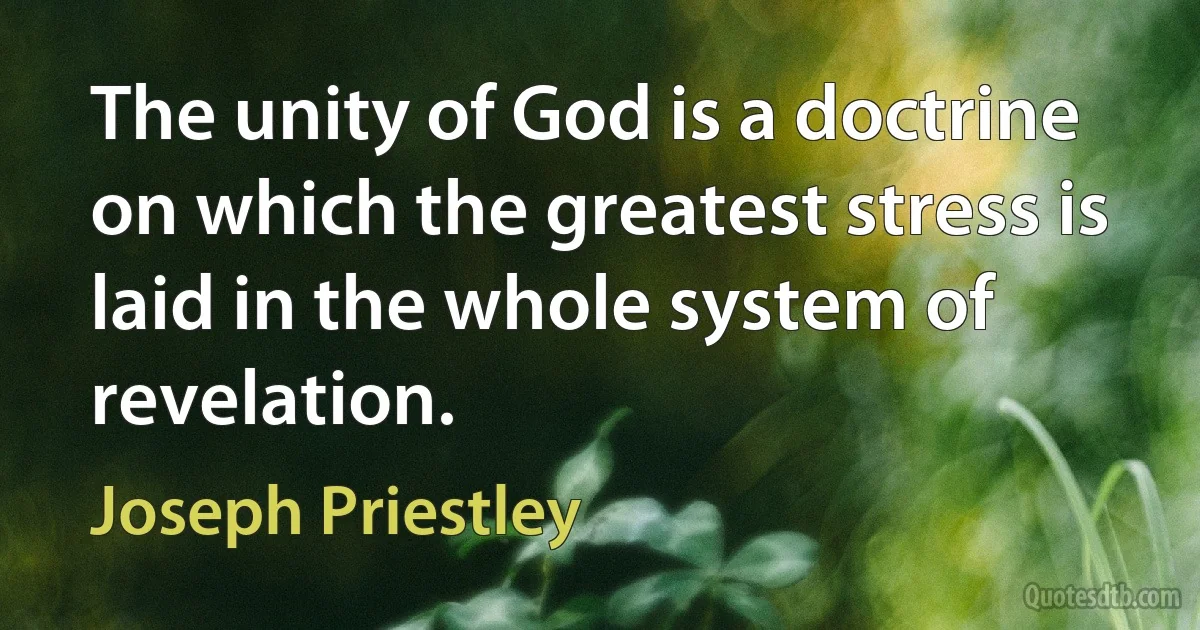Joseph Priestley quotes - page 3
Most of the early Christian writers thought the text "I and my Father are one," was to be understood of an unity or harmony of disposition only. Thus Tertullian observes, that the expression is unum, one thing, not one person; and he explains it to mean unity, likeness, conjunction, and of the love that the Father bore to the Son. Origen says, "let him consider that text, 'all that believed were of one heart and of one soul,' and then he will understand this, 'I and my Father are one".

Joseph Priestley
Having thought it right to leave behind me some account of my friends and benefactors, it is in a manner necessary that I also give some account of myself; and as the like has been done by many persons, and for reasons which posterity has approved, I make no further apology for following their example. If my writings in general have been useful to my contemporaries, I hope that this account of myself will not be without its use to those who may come after me, and especially in promoting virtue and piety, which, I hope I may say, it has been my care to practise myself, as it has been my business to inculcate them upon others.

Joseph Priestley
It is the earnest wish of my heart, that your minds may be well established in the sound principles of religious knowledge, because I am fully persuaded, that nothing else can be a sufficient foundation of a virtuous and truly respectable conduct in life, or of good hope in death. A mind destitute of knowledge (and, comparatively speaking, no kind of knowledge, besides that of religion, deserves the name) is like a field on which no culture has been bestowed, which, the richer it is, the ranker weeds it will produce, If nothing good be sown in it, it will be dccupied by plants that are useless or noxious.

Joseph Priestley
The mind of man will never be able to contemplate the being, perfections, and providence of God without meeting with inexplicable difficulties. We may find sufficient reason for acquiescing in the darkness which involves these great subjects, but we must never expect to see them set in a perfectly clear light. But notwithstanding this, we may know enough of the divine being, and of his moral government, to make us much better and happier beings than we could be without such knowledge; and even the consideration of the insuperable difficulties referred to above is not without its use, as it tends to impress the mind with sentiments of reverence, humility, and submission.

Joseph Priestley
That miracles are things in themselves possible, must be allowed so long as it is evident that there is in nature a power equal to the working of them. And certainly the power, principle, or being, by whatever name it be denominated, which produced the universe, and established the laws of it, is fully equal to any occasional departures from them. The object and use of those miracles on which the christian religion is founded, is also maintained to be consonant to the object and use of the general system of nature, viz. the production of happiness. We have nothing, therefore to do, but to examine, by the known rules of estimating the value of testimony whether there be reason to think that such miracles have been wrought, or whether the evidence of Christianity, or of the christian history, does not stand upon as good ground as that of any other history whatever.

Joseph Priestley
What does Priestley mean, by an unbeliever, when he applies it to you? How much did he unbelieve himself? Gibbon had it right when he denominated his Creed, "scanty." We are to understand, no doubt, that believed the resurrection of Jesus, some of his miracles, his inspiration; but in what degree? He did not believe in the inspiration of the writings that contain his history. Yet he believed in the Apocalyptic beast, and he believed as much as he pleased in the writings of Daniel and John. This great and extraordinary man, whom I sincerely loved, esteemed, and respected, was really a phenomenon; a comet in the system, like Voltaire, Bolingbroke, and Hume. Had Bolingbroke or Voltaire taken him in hand, what would they have made of him and his Creed?

Joseph Priestley

![Why did the problem of air become visible..? Why were Priestley, Boyle and Black able to see the question clearly enough..? ...because they had new tools. The air pump designed by Otto von Guericke and Boyle (...in collaboration with his assistant Robert Hooke...) were essential to Priestley's lab in Leeds. ...In a way, the air pump had enabled the entire field of pneumatic chemistry in the seventeenth century... [T]he air pump allowed you to... create a vacuum, which behaved markedly differently... even though air and the absence of air were visually indistinguishable. (Joseph Priestley)](https://cdn.quotesdtb.com/img/quotes_images_webp/88/joseph-priestley-able-absence-1013288.webp)
